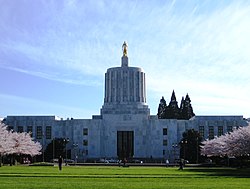| 72nd Oregon Legislative Assembly | |||||
|---|---|---|---|---|---|
| |||||
 The legislature took place in the Oregon State Capitol, seen here in 2007 | |||||
| Overview | |||||
| Legislative body | Oregon Legislative Assembly | ||||
| Jurisdiction | Oregon, United States | ||||
| Meeting place | Oregon State Capitol | ||||
| Term | 2003–2005 | ||||
| Website | www.oregonlegislature.gov | ||||
| Oregon State Senate | |||||
| Members | 30 Senators | ||||
| Senate President | Peter Courtney (D) | ||||
| Majority Leader | Kate Brown (D) | ||||
| Minority Leader | Roger Beyer (R) | ||||
| Party control | Democratic | ||||
| Oregon House of Representatives | |||||
| Members | 60 Representatives | ||||
| Speaker of the House | Karen Minnis (R) | ||||
| Majority Leader | Tim Knopp (R) | ||||
| Minority Leader | Deborah Kafoury (D) | ||||
| Party control | 35-R, 25-D | ||||
The 72nd Oregon Legislative Assembly convened in January 2003 for its regular session, which on August 8 of that year surpassed the 1993 session as the longest in the U.S. state of Oregon's history. [1] In the senate, which was evenly divided between 15 Democrats and 15 Republicans, Democratic President Peter Courtney and Republican President Pro Tempore Lenn Hannon were praised by The Oregonian for managing to avoid partisan gridlock. [2] The House was composed of 35 Republicans and 25 Democrats.
Contents
Then-state senator Betsy Johnson cited reasons for the extended session in a legislative update: a need to revamp the state budget in the face of declining revenues, and the political dynamics of a new Democratic governor (Ted Kulongoski), a Republican-controlled House of Representatives, and the evenly divided Senate. [1]
The legislature passed a major reform of the state public pension program, PERS, and approved the biggest state transportation investment plan in Oregon history. [3]
In contrast with the 71st Oregon Legislative Assembly, which held five special sessions in 2002, the 72nd convened only for its regular 2003 session, and did not convene in 2004. [4]